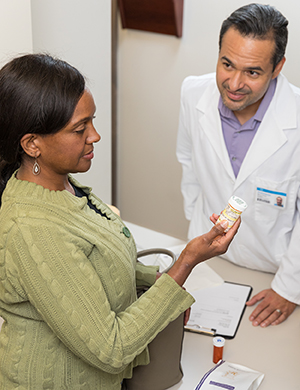Using Antidepressants (Adult)
Depression is a type of mood disorder. It affects the way you think and feel. The most common symptom is a feeling of deep sadness. This feeling doesn't go away or get better on its own. But most types of depression can be helped with therapy and antidepressant medicines. ( Note: This sheet covers antidepressant use in adults only.)

What do antidepressants do?
Antidepressants are medicines. They help restore the balance of certain chemicals in your brain. This can help ease your depression. You will likely feel better in 4 to 6 weeks. But depression can recur if you stop taking the medicine. It is usually advised that you keep taking medicine for 1 year or more. Some people need to take antidepressants for life. There are several types of these medicines. Your healthcare provider will advise a certain type of medicine based on the possible side effects, your specific symptoms, and other illnesses you may have. They will also look at your current medicines for possible drug-drug interactions. The main types of antidepressants are described below.
Selective serotonin reuptake inhibitors (SSRIs)
SSRIs are the most common category of antidepressants. They tend to have fewer side effects than other antidepressants. Side effects can include:
-
Anxiety
-
Trouble sleeping
-
Nausea
-
Diarrhea
-
Sexual dysfunction
-
Headaches
In rare cases, they may make you more depressed. SSRIs shouldn’t be mixed with certain other medicines. Tell your healthcare provider all the medicines, vitamins, herbs, and supplements you are taking before you start an SSRI. Check with your pharmacist about possible drug interactions before buying and using any other over-the-counter medicines.
Tricyclic antidepressants
Tricyclics help severe or long-term depression. They have been used for many years with good results. Side effects can include:
-
Blurred vision
-
Dry mouth
-
Constipation
Monoamine oxidase inhibitors (MAOIs)
If tricyclics or SSRIs don't work for you, your healthcare provider may prescribe an MAOI. These types of medicines can work very well. But people taking MAOIs must stay away from certain foods and medicines. See below and ask your healthcare provider or pharmacist for more information.
Lithium
Lithium is a medicine that helps even out mood. It is used for:
-
Bipolar disorder
-
Unipolar depression not helped by other antidepressants
-
A sudden (acute) episode of unipolar depression
-
Maintenance medicine to prevent more unipolar depression
Side effects can include:
-
Weight gain
-
Trembling
-
Loose poop
-
Nausea
Things to avoid if you take an MAOI
If you take an MAOI, don’t have any of these foods, drinks, or medicines:
-
Beans
-
Aged cheese
-
Chocolate
-
Red wine
-
Most cold medicines
-
Other medicines. This includes prescribed medicines and over-the-counter medicines such as cold or pain remedies, vitamins, and supplements. Ask your healthcare provider or pharmacist for more information.
To reduce the risk of lithium poisoning
Lithium poisoning means there is too much of it in your body. This can happen if you take too much in 1 dose or over time. To reduce the risk of lithium poisoning:
-
Take only the prescribed amount of lithium. If your depressive symptoms get worse, contact your healthcare provider. Never change your medicine dose on your own.
-
Drink plenty of fluids other than coffee, tea, and soda.
-
Limit salt in your diet.
-
Talk with your pharmacist before you use any other medicines. This includes prescribed medicines and over-the-counter medicines. This is to be sure the medicines won’t interact with the lithium.
-
Never share your medicines or use another person's medicines, even if it is the same medicine and dose.
-
Keep all of your follow-up appointments.
-
Have your lithium blood level routinely checked as advised, even when you are symptom-free. You will need blood tests more often when your symptoms are not in control.
If you have side effects
The side effects of antidepressants are usually mild. But if you have side effects that bother you a lot, call your healthcare provider. They may change the dose or type of medicine to help. Never change your medicine dose or stop taking medicines on your own.